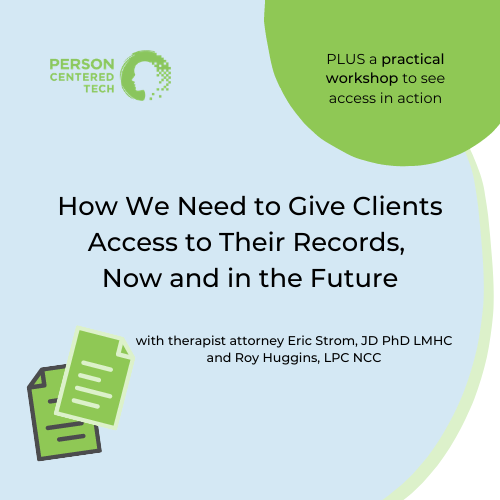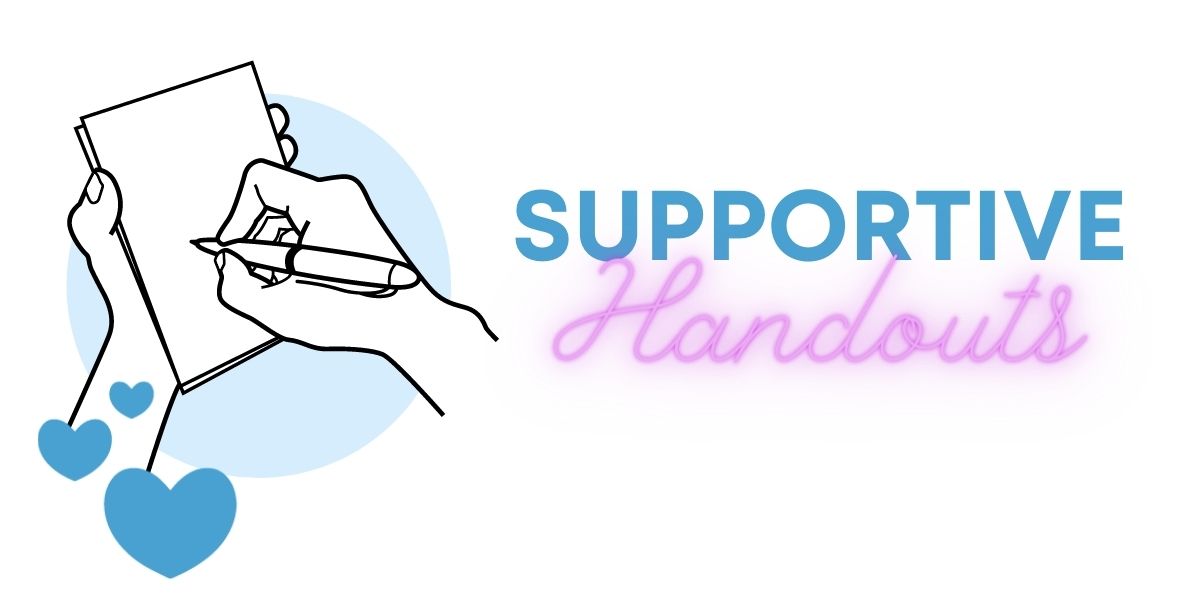Self Study Course and Workshop on Rights Of Access
How We Need to Give Clients Access to Their Records,
Now and in the Future
A practical exploration of Rights of Access and the Information Blocking Rule with both a framework and a practical workshop so you’ll leave knowing how to tackle Information Access in your practice.
On Demand Self Study
Things you’ll be wondering:
- Presented by therapist attorney Eric Strom, JD PhD LMHC and Roy Huggins, LPC NCC
- 2 CE credit hours + practical workshop.
- Q&A will take place after the presentation.
- Event will be recorded. Self study course will be released after event.

The Framework. The Practical Application. The Confidence.
This presentation for Counselors, Clinical Social Workers, Marriage and Family Therapists, and Psychologists in both solo and group practice settings will review fundamental access rights under HIPAA and explore the ways that access rights at the federal level are expanding and changing. It will also cover common ways in which state laws expand these rights, as well as some of the vital vicissitudes of rights to access in couples and family therapy.
Reviewing rules and regulations is not everyone’s favorite thing to do, but we try to make it interesting if not fun.
So, thank you for making HIPAA as fun as it can be!! Keep it up! I am thankful to have found PCT early in my practice and I am glad you guys are in my life :)
Couples and Families Insights
How access rights for records can be affected by the designation of an Identified Patient, such as in couples or family therapy
Information Blocking Rule
How the Information Blocking rule, aka the “Open Notes Rule”, impacts clients’ rights of access to records
Scope of Rights
Identify which portions of a client’s record are their right to access under HIPAA, and how state laws may expand the scope of those rights

Plus Client Record Access Checklist
Preparation
Prepare for coming changes to HIPAA which may impact clients’ rights around the content of records releases or the manner of receiving records
HIPAA Rights Of Access Information
HIPAA has given clients extensive rights to access their records since the early 21st century. However, mental and behavioral health clinicians have, as a field, been slow to adapt to the style and degree of record access that clients have a right to. What’s more, rapid technological and social changes have driven states and the federal government to further expand individuals’ rights to both inspect and receive copies of their records.

Course Details
2 Legal-Ethical CE Credit Hours. Live. Interactive Seminar. Sponsored by Person Centered Tech.
Title: How We Need to Give Clients Access to Their Records, Now and in the Future
Authors/Presenters: Eric Strom, JD PhD LMHC; Roy Huggins, LPC NCC
Legal-Ethical CE Hours: 2 CE credit hours, legal-ethical
Educational Objectives:
- List which portions of a client’s record are their right to access under HIPAA, and how state laws may expand the scope of those rights
- Describe how access rights for records can be affected by the designation of an Identified Patient, such as in couples or family therapy
- Describe how the Information Blocking rule, aka the “Open Notes Rule”, impacts clients’ rights of access to records
- Prepare for coming changes to HIPAA which may impact clients’ rights around the content of records releases or the manner of receiving records
Syllabus:
- Fundamentals of HIPAA
- Client Right of Access
- State Laws
- Identifying the Client
2. Current and Upcoming Changes to Access Rights
- Proposed changes to HIPAA’s Privacy Rule
- The Information Blocking Rule
Meet Our Presenters
Presented by Eric Strom, JD PhD LMHC; Roy Huggins, LPC NCC

Eric Ström JD PhD LMHC is an attorney and Licensed Mental Health Counselor in Seattle, Washington. As an attorney, Eric provides legal counsel, consultation, and guidance to mental health professionals. Eric’s counseling practice is focused on providing counseling services to combat veterans as well as providing supervision and consultation to other clinicians. Eric currently serves on the American Mental Health Counselors Association Ethics Committee, and is the ethics advisor for the Washington Mental Health Counselors Association. Eric has taught a range of courses in counseling and professional ethics at a variety of graduate and undergraduate programs.
Eric earned a PhD in Counselor Education and Supervision at Oregon State University, a Master of Arts Degree in Counseling Psychology from the Northwest School of Professional Psychology at Argosy University Seattle, graduated cum laude from Wayne State University School of Law in Detroit Michigan, attended the Hague Academy of International Law in the Hague Netherlands, and received a Bachelor of Arts degree in Linguistics from the University of Michigan.

Roy Huggins, LPC NCC, is a counselor in private practice who also directs Person-Centered Tech. Roy worked as a professional Web developer for 7 years before changing paths and makes it his mission to grow clinicians’ understanding of the Internet and other electronic communications mediums for the future of our practices and our professions.
Roy is an adjunct instructor at the Portland State University Counseling program where he teaches Ethics and is a member of the Zur Institute advisory board. He has acted as a subject matter expert on HIPAA, security, and clinical use of technology for Counseling licensure boards, and both state and national mental health professional organizations. He has co-authored or authored 2 book chapters, and he routinely consults with mental health colleagues on ethical and practical issues surrounding tech in clinical practice. He served for 5 years on the board of the Oregon Mental Health Counselors Association and then the Oregon Counseling Association as the Technology Committee Chair.
He really likes this stuff.
Additional Information
Citations:
- Information Blocking and the ONC Health IT Certification Program: Extension of Compliance Dates and Timeframes in Response to the COVID-19 Public Health Emergency, 85 FR 70064 (November 4, 2020) (to be codified at 45 CFR parts 170, 171)
- US Dept. of Health and Human Services. (2006). HIPAA Administrative Simplification. Washington, DC: Author.
- US Dept. of Health and Human Services. (2013). HIPAA Omnibus Final Rule. Washington, DC: Author.
- US Dept. of Health and Human Services. (2020). Proposed Modifications to the HIPAA Privacy Rule to Support, and Remove Barriers to, Coordinated Care and Individual Engagement. Retrieved January 08, 2021, from https://www.hhs.gov/sites/default/files/hhs-ocr-hipaa-nprm.pdf
- US Dept. of Health and Human Services. (2021). Information Blocking FAQs. Retrieved January 21, 2021, from https://www.healthit.gov/curesrule/resources/information-blocking-faqs
Accuracy, Utility, and Risks Statement: This program discusses strategies for complying with HIPAA and some other US Federal rules. It may not include information on all applicable state laws. Misapplication of the materials, or errors in the materials, could result in non-compliance with applicable laws or ethics codes.
Conflicts of Interest: Huggins is a co-owner of Person Centered Tech Inc., which will be giving a commercial presentation during break times.
Commercial Support: Person Centered Tech Inc. is sponsoring this event and will give a brief commercial presentation during the break.
